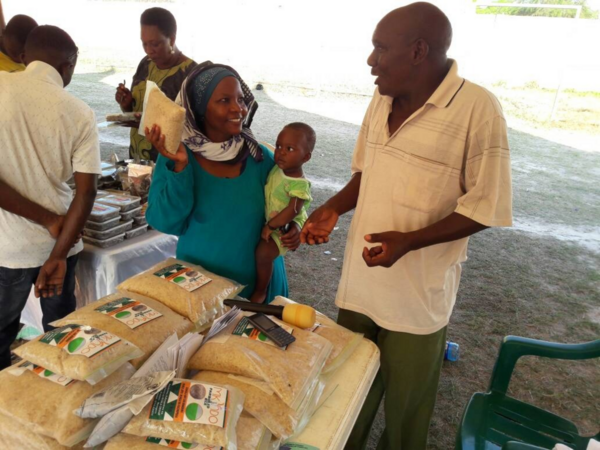- Share this article
- Subscribe to our newsletter
RIPOMA – increasing food security and household income in Tanzania
Rice is one of the most essential food and cash crop in Tanzania. It is cultivated mostly by smallholder farmers for household use and as a cash crop for sale at local and regional markets. Post-harvest losses claim more than 30 per cent of grains each harvesting season. This can cost a smallholder family up to 40 per cent of income from rice.
Helvetas Tanzania’s work in women economic empowerment focuses on agricultural markets. It has identified women’s participation in agricultural markets as a main driver to achieve women market inclusion and market system change in general. The Rice Postharvest Management and Marketing (RIPOMA) project is an initiative of Helvetas Tanzania and is funded by EuropeAid. It aims to increase income and reduce poverty among smallholder households in the Southern Agricultural Growth Corridor of Tanzania through empowering young and women smallholder rice farmers in innovative rice postharvest techniques and Marketing.
RIPOMA is designed to reach 3,000 smallholder farming households and over 130 specific value chain actors, and it promotes an inclusive market system development approach, women and youth economic empowerment and good agricultural practices. Project activities include, among others, training rice producers on postharvest technologies and strengthening technical postharvest management services provision, but also introducing village-based micro-finance mechanisms and training in entrepreneurship, business management and Marketing.
At national level, policy advocacy on postharvest management takes place through the Helvetas Tanzania-facilitated Grain Postharvest Loss Prevention (GPLP) project, which has established the Tanzania Postharvest Management Platform consisting of various stakeholders including the country’s agriculture, industry and trade ministries, civil society organisations and other key actors. The platform advocates for the development of a national postharvest management strategy.
A RIPOMA success story – woman farmer Edith Malik Clemence
One focus of the RIPOMA initiative is to provide trainings for women and young adults in commercial parboiled rice. Since the start of the project, a total of 100 rice producer groups have been founded, of whom 61 per cent live in the project region of Mvomero and 39 per cent in Kilosa. These groups have a total of 2,868 members (2,094 women and 774 men). Each rice producer group is headed by a lead farmer who takes part in training courses and then passes on his or her acquired knowledge to the members.
Forty-one-year-old Edith Malik Clemence was also informed about the Helvetas project and was very interested in taking part in a training programme, as she had been cultivating rice before the start of the project without having anybasic knowledge of "good agricultural practices". She became a member of the Uwezo Rice Producer Group in the village of Dihombo in the district of Mvomero.
After the training, Edith quickly realised that she had previously planted her seedlings far too late and had never ploughed the soil well enough to plant the seedlings properly.
(Helvetas/wi)
Helvetas tells the success story of Edith Malik Clemence, a young female entrepreneur. Read more:
www.helvetas.org/en/tanzania/what-we-do/how-we-work/our-projects/Africa/Tanzania/Tanzania-rice-postharvest-management-marketing-RIPOMA-project
Sustainable agriculture, food security and the development of market systems are core elements of Helvetas’ work. You can learn more about activities in these areas at the website: www.helvetas.org/en/switzerland/what-we-do/our-topics/economies





Add a comment
Be the First to Comment